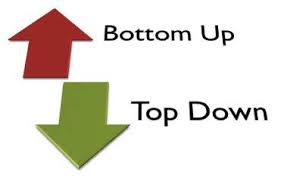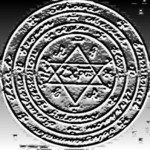 I was chatting with Niki Whiting today about blogs and such and she made the following comment:
I was chatting with Niki Whiting today about blogs and such and she made the following comment:
“The blogosphere is starting to represent the educated academia. We are debating the angels on the head of a pin. It bears little resemblance to most people’s experience, yet it is valuable, because theology develops from top down ideas and bottom up experiences, and in turn influence each other.”
There’s a lot in that comment, some I agree with and some I don’t, but it’s all worth thinking about. When I look at Paganism as a whole I think that it’s been far more influenced by doing, and less on thinking. In that sense I think that the “bottom up experiences” are what has allowed our movement to thrive and grow. Certainly there are people who come to Paganism for the ideas, but people generally stay with Paganism because of the experience. The moment I spoke my first prayer to the Goddess I felt a tingle inside of me that had been absent from my Christian experience. For me Paganism has always been about the moments with something greater than myself. I don’t need that defined to prove the reality or validity of it. I really could care less whether someone thinks I’m a soft-polytheist or a hard-polytheist, that seems completely immaterial to the experience.
 Perhaps general Paganism is beyond theology anyways. For example an argument about polytheism coming from five separate Pagans from five different traditions is rather pointless because obviously they don’t agree. If they all agreed they’d all be in the same tradition. I don’t think anyone out there in the Pagan Blogosphere thinks for a second that British-Traditional-Wicca-Lady speaks for Norse Re-constructionists . . . . and yet when you read online arguments it seems as if people are worried about precisely that. I don’t think I live in a bubble, but perhaps I’m naive and people really do think that everything John Beckett writes is meant to be a sweeping pronouncement on exactly how to be a Pagan? I think John would be horrified if that were the case.
Perhaps general Paganism is beyond theology anyways. For example an argument about polytheism coming from five separate Pagans from five different traditions is rather pointless because obviously they don’t agree. If they all agreed they’d all be in the same tradition. I don’t think anyone out there in the Pagan Blogosphere thinks for a second that British-Traditional-Wicca-Lady speaks for Norse Re-constructionists . . . . and yet when you read online arguments it seems as if people are worried about precisely that. I don’t think I live in a bubble, but perhaps I’m naive and people really do think that everything John Beckett writes is meant to be a sweeping pronouncement on exactly how to be a Pagan? I think John would be horrified if that were the case.
One thing about Niki’s statement that I agree with whole heartedly is that: “The blogosphere is starting to represent the educated academia.” Over the last two years I’ve come to realize just how intensely and intelligently we debate nearly everything. Recent debates over monism are an example of that, but do most Pagans even know what “monism” is? More to the point how many Pagans really care? This is a trick question because it means thinking outside of the blogosphere for a second, remember there are perhaps two million Pagans in the United States and only a fraction of those people are regular readers of the Pagan Blogosphere. So is monism something the average Pagan wants to spend hours debating? Is a continued debate over monism really essential to their belief structure? Are extended, and often far too personal, debates really accomplishing anything or are they online pissing contests?
Don’t get me wrong, I think matters of theology are important. How we use words matters, how we self-identify matters, but how much does it matter? It’s great that so many Pagans think and write at a high college level, but who is all that academic speech being directed at? I have to confess, there are a lot of Pagan bloggers I genuinely like, respect, and agree with, but they write at such a high level that I’ve kind of given up on reading them. I think Gus diZerega has a lot to say, but there are times when I just can’t get through it. I don’t want to have a theology debate at 2:00 in the afternoon in between my own book and blog writing. I’m not saying that what he’s writing is unimportant, only that I sometimes can’t keep up with it.
 That leads me to the question at the top of this essay. Who are we writing for? Are we creating a Pagan Blogosphere open to everyone or are we creating a rather exclusive little collection of theologians? I ran a few Pagan blogs through a readability app and was amazed to discover that some of them score similarly to The Harvard Law Review. That’s probably not average, but these are blogs in public Pagan areas like Patheos Pagan and Pagan Square. I ran a portion of this column through the same app and my writing ended up on par with Reader’s Digest. My wife chuckled when I told her that, but I was happy with that result. It’s my hope that I write smart and intelligent pieces here at Raise the Horns, but I also want them to be accessible to anyone who stumbles across them. I’m not arguing that “smart is bad” or that we shouldn’t have intelligent discussions about theology, but we are certainly limiting the debate by writing at such a high level.
That leads me to the question at the top of this essay. Who are we writing for? Are we creating a Pagan Blogosphere open to everyone or are we creating a rather exclusive little collection of theologians? I ran a few Pagan blogs through a readability app and was amazed to discover that some of them score similarly to The Harvard Law Review. That’s probably not average, but these are blogs in public Pagan areas like Patheos Pagan and Pagan Square. I ran a portion of this column through the same app and my writing ended up on par with Reader’s Digest. My wife chuckled when I told her that, but I was happy with that result. It’s my hope that I write smart and intelligent pieces here at Raise the Horns, but I also want them to be accessible to anyone who stumbles across them. I’m not arguing that “smart is bad” or that we shouldn’t have intelligent discussions about theology, but we are certainly limiting the debate by writing at such a high level.
Is the end-game to all of this a creation of two online worlds? Do the scholars get their little place in the sun while the rest of us read the inevitable Pagan version of Buzzfeed? As John Beckett put it last week “decisions are made by those who show up,” but what happens when we lock the door and don’t let everybody in? Theology is great, and people should feel free to debate monism to their heart’s content, but I want to read about those “bottom up” experiences. I think there’s an old bumper sticker that says “I’m a tree hugging dirt worshipper,” and I identify with that. I always want to be able to see the forest for the trees.
Do you like Raise the Horns? Even if you don’t would you be interested in humoring me? Like us on Facebook, and also like Patheos Pagan for more great articles just like this one. All you gotta do is click on those links.

















